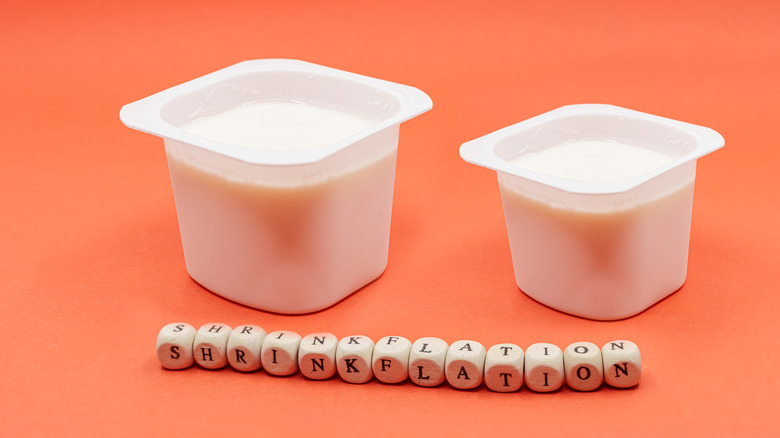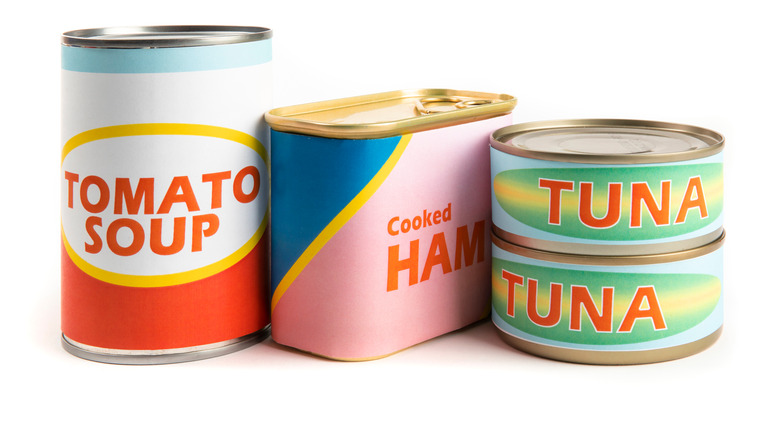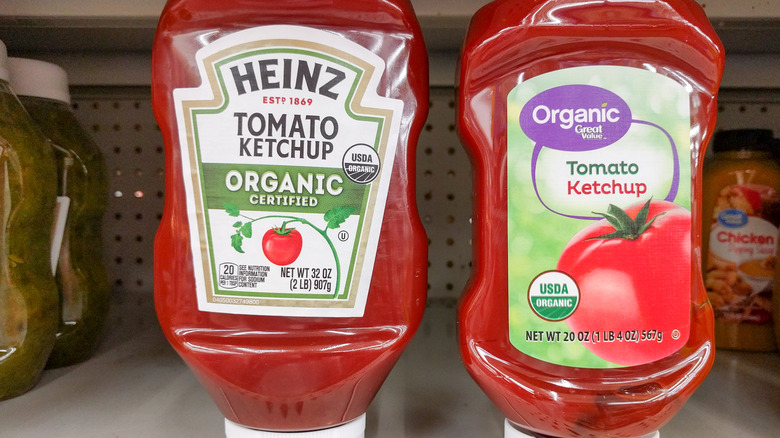New Survey Examines Shoppers' Frustration With Grocery 'Shrinkflation'
By now, everyone's felt the pinch of 40-year-high inflation at the grocery store. It's not enough to clip coupons and shop the sales — a sneaky practice known as "shrinkflation" has been eating away at your grocery dollars as well. Much like it sounds, shrinkflation is when companies quietly make their products smaller but still charge the same price — or more.
From boxes of cereal to bags of sugar, if it seems like your favorite brands are getting smaller, it's not your imagination. Marketplace reported in January that shrinkflation is an issue that's been going on for decades. The problem is so endemic, there's even a man who has dedicated years to covering every instance of shrinkflation from cough syrup to toilet paper, notes The New York Times.
According to a new survey from YouGov, however, the combination of super-high inflation and shrinkflation has grocery shoppers leaving brand-name groceries on the shelves in droves. Instead, they're increasingly turning to private label or generic products. Even more of a wake-up call for product companies: According to a different study of consumer behavior by Attest (via Grocery Dive), a lot of those shoppers don't plan to switch back to name-brands if or when the economy improves.
Shrinkflation awareness
Shrinkflation has been around for a long time. The term was coined in 2009, according to the Corporate Finance Institute. Savvy shoppers have grumbled about the practice for decades, but the recent record-high inflation has increased awareness as people look for ways to save money on their eye-popping grocery bills. According to data from a YouGov survey published April 3, 73% — almost three quarters — of American consumers have shrinkflation on their radar. Of those respondents, nearly half (46%) said that they will likely buy private label (aka generic) products, and 45% said that they would switch to different brands.
There was a time when buying generic groceries was looked down upon, and it's taken many decades for store-brand groceries to overcome their image problem. "'Generics' is derogatory," Tod Marks, senior projects editor at Consumer Reports, said to Business Insider in 2014. "It harkens back to the 1970s, when the economy was struggling and a lot of stores came out with generic products. They were canned or packaged goods in nondescript, simple containers that said 'green beans' or 'peaches.' They weren't very good, but they were cheap. And when the economy wasn't very strong, they appealed to a lot of people."
Nowadays, however, generic groceries are largely seen by savvy shoppers as just as good as comparable name-brand products, thanks to higher quality and "premiumization," explains Grocery Dive. Lots of private-label products even enjoy cult followings, such as Costco's Kirkland Signature olive oil and Trader Joe's Mandarin orange chicken.
Shoppers say they won't be back
Inflation is cooling a bit in 2023, and big-name companies are noticing the shift in shopping trends. FoodNavigator USA reports that big consumer packaged goods companies such as Coca-Cola, PepsiCo, and Nestlé will pay the price in lost customers if they continue to raise prices in 2023. In fact, it might be too late for the customers they've already lost to other brands.
Grocery Dive reports that in a 2023 report from Attest, 73% of the people who have switched to private-label groceries as a result of inflation and shrinkflation during the past few years plan to keep buying generic. Only 9% plan to return to name brands if prices and the economy improve. Furthermore, YouGov reports that 48% Americans over age 55 say they plan to stop buying certain products altogether. And 39% of 18-34-year-olds say they'll buy bulk-sized products instead of smaller packages.
Either way you slice it, more people know that private-label groceries are often just as good as the big names and cost a lot less. American shoppers are putting name brands on notice.


